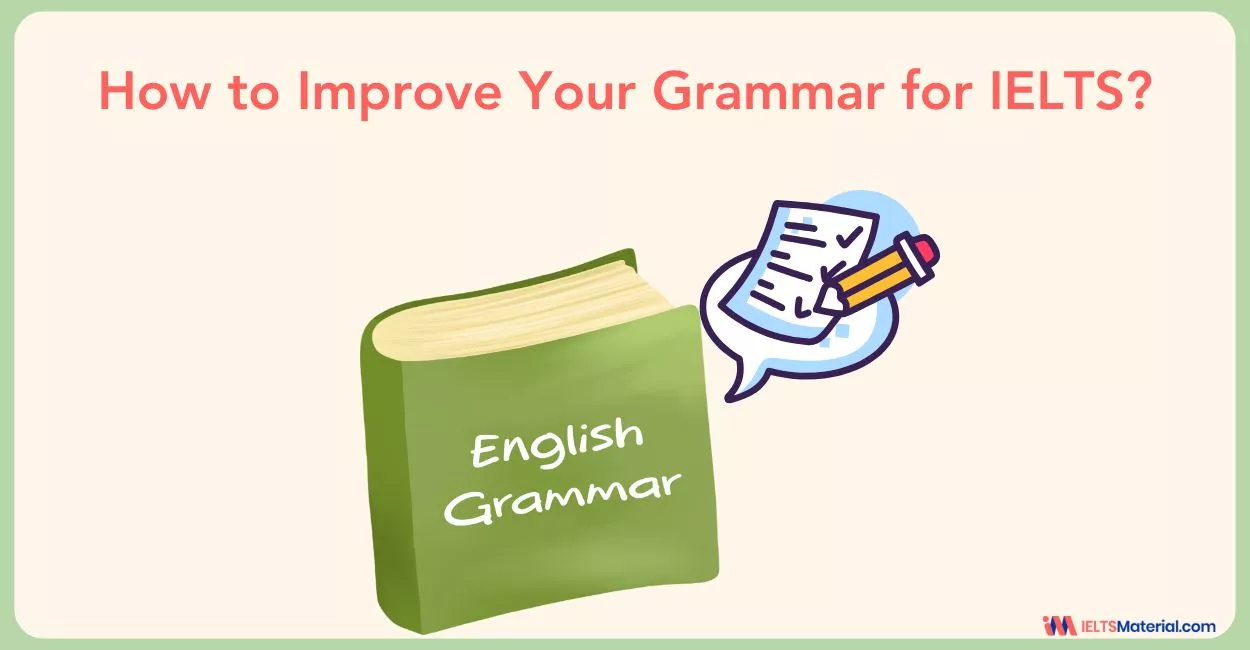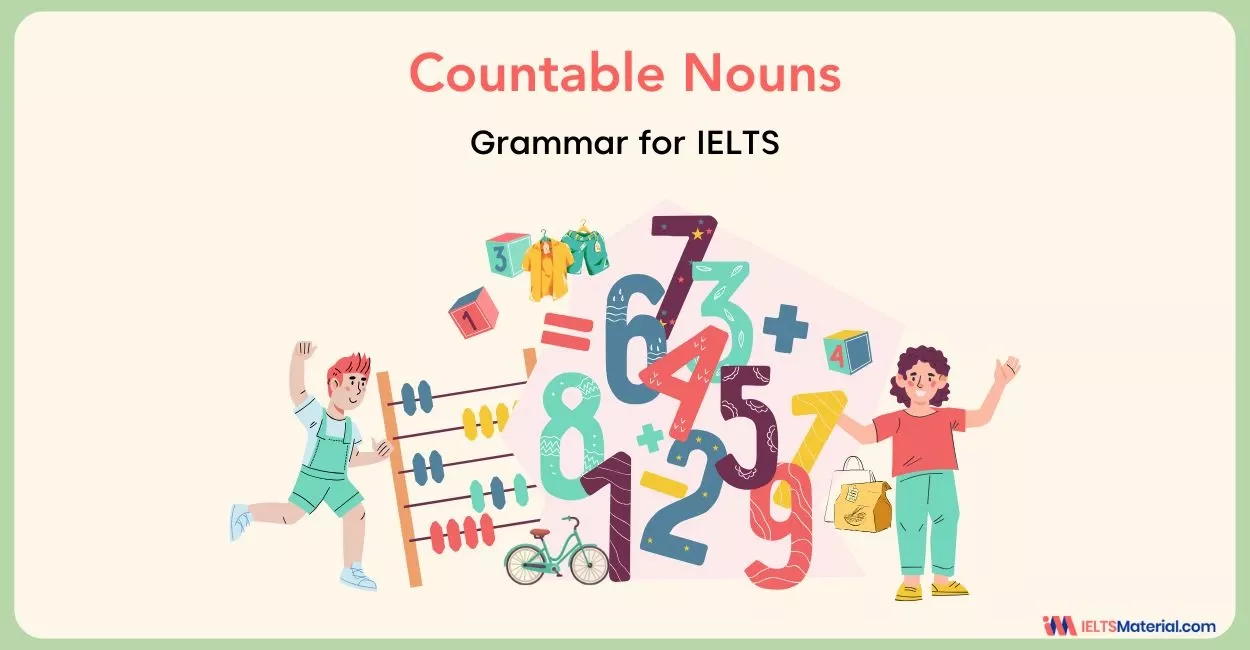Grammar For IELTS: Diagnostic Test, Explanation and Practice Exercises for IELTS Academic & IELTS General Training
5 min read
Updated On
-
Copy link
This guide on Grammar for IELTS covers diagnostic tests, detailed explanations, & practice exercises for both Academic & General. Learn grammar rules, avoid common mistakes, & enhance your Writing & Speaking skills to achieve a higher IELTS band score.
Table of Contents

Limited-Time Offer : Access a FREE 10-Day IELTS Study Plan!
A strong command of grammar is essential for success in IELTS Academic and General Training. One of the most common areas where test-takers struggle is with gradable and ungradable adjectives. Using the wrong modifier (e.g., absolutely cheap instead of very cheap) can make your sentences sound unnatural and lower your band score.
This guide provides you with a diagnostic test, grammar explanation, and practice exercises to help you master this tricky but important IELTS grammar topic.
Diagnostic Test: Gradable and Ungradable Adjectives
Tick (✓) the correct sentences and underline the mistakes.
Examples:
- Some of these new laptops are hideously expensive. ✓
- As usual, he bought me something absolutely cheap. ✗ (should be very cheap)
Now, check the following:
- Iceland is colder than Sweden.
- Casualties during the Crimean War were very enormous.
- Steve’s new girlfriend is very attractive.
- Clients are advised that Miami tends to be more boiling than Los Angeles during the winter months.
- Milan Cathedral is slightly huge.
- Thank you. That really was a most delicious meal!
- In many areas of Europe the wolf is virtually extinct.
- My friend told me the film was dead exciting.
- Last night’s episode was really gripping.
- I can’t stand that actor; he’s absolutely ugly.
- The club’s very empty for a Saturday night.
- It’s slightly free to get in; less than one Euro, in fact.
Answer Key (sample corrections):
- very enormous → absolutely enormous
- more boiling → hotter
- slightly huge → slightly big
- absolutely ugly → really ugly
- slightly free → absolutely free
Want to improve your grammar? Get the newly launched IELTS Grammar book today!
Grammar Explanation: Gradable vs. Ungradable Adjectives
What are Adjectives?
Adjectives are describing words that tell us more about nouns. They can be divided into:
- Gradable adjectives → have degrees of comparison (cold, expensive, attractive).
- Ungradable adjectives → describe absolute or extreme qualities (freezing, priceless, tiny).
Gradable Adjectives
Gradable adjectives express qualities that can vary in intensity.
Examples:
- cheap → expensive
- cold → hot
- small → large
We can use modifiers to strengthen or weaken gradable adjectives.
-
Stronger: very, really, terribly, extremely, highly
- The movie was terribly exciting.
- She is highly intelligent.
-
Weaker: fairly, slightly, a bit, somewhat
- I’m feeling slightly dizzy.
- That’s a bit expensive.
Feeling stuck with IELTS Grammar? Register for our webinar and unlock your potential today!
Special Collocations:
Some adverbs naturally collocate with specific adjectives:
- bitterly disappointed
- painfully shy
- deeply ashamed
Ungradable Adjectives
Ungradable adjectives describe qualities that are absolute and cannot usually be made stronger or weaker.
Examples:
- free, priceless (cost)
- freezing, boiling (temperature)
- tiny, enormous (size)
We do not say very priceless or more freezing. Instead, we use:
-
Intensifiers: absolutely, completely, utterly, totally, quite
- The sea was absolutely freezing.
- You’re quite correct.
-
Approximators: almost, nearly, virtually, practically
- The battery is almost dead.
- It’s practically impossible.
Mixed Usage
Some adjectives can be both gradable and ungradable depending on context:
- The hotel is full. (ungradable = no space)
- The hotel is very full. (gradable = nearly no space but still some)
Other adjectives like this: empty, beautiful, delicious, possible.
Struggling with grammar for the IELTS? Sign up for our online class & master the words to succeed!
Practice Exercises
Exercise 1: Fill in the blanks
Choose the correct adverb.
-
Jim hates speaking in public; he’s ______ shy.
a) absolutely b) completely c) painfully -
The Wimbledon final was ______ exciting.
a) absolutely b) utterly c) terribly -
Your bracelet looks ______ expensive.
a) very b) completely c) absolutely -
I feel ______ sick.
a) practically b) a little bit c) virtually -
Yes, sir. You’re ______ correct.
a) quite b) very c) rather
Exercise 2: Make it stronger or weaker
Rewrite using the words in brackets.
-
These days mobile phones are inexpensive. (fairly)
→ Mobile phones are fairly inexpensive. -
Jane’s flat was freezing last night. (absolutely)
→ Jane’s flat was absolutely freezing. -
Hilary’s new boyfriend is rich. (fabulously)
→ Hilary’s new boyfriend is fabulously rich. -
Victory in our next game seems unlikely. (highly)
→ Victory in our next game seems highly unlikely.
Exercise 3: Formality levels
Label each as Formal, Informal, Very Informal, or US English.
- We were wearing the same outfit! It was dead embarrassing. → Very Informal
- The cave paintings were real impressive. → US English
- The professor’s lecture was most illuminating. → Formal
- These new engines are pretty reliable. → Informal
Exercise 4: IELTS-Style Correction
Correct the errors:
- The fridge is very empty. → completely empty
- The bus is completely full so only six seats left. → very full
- The hotel was very recommended. → highly recommended
- Jack was a very built man. → heavily built
- I found the ceremony absolutely moving. → deeply moving
Common Adverb + Adjective Collocations
Here are some useful combinations to memorize for IELTS Speaking and Writing:
- Bitterly disappointed, cold
- Completely different, alone
- Deeply ashamed, attached
- Highly intelligent, skilled, recommended
- Utterly useless, appalled
- Totally unacceptable, destroyed
Using natural collocations will make your English sound fluent and Band 7+.
Why This Matters for IELTS?
- Speaking: Correct adjective + adverb use makes answers sound natural.
- Writing: Helps you write precise, academic sentences without errors.
- Listening/Reading: Recognizing collocations boosts comprehension.
Explore our IELTS eBook store for top-rated books curated by experts. Buy now & elevate your IELTS preparation!
Gradable and ungradable adjectives may seem like a small grammar point, but they make a big difference in fluency and accuracy. Mastering how to strengthen or weaken adjectives naturally will help you avoid mistakes like absolutely cheap and instead use phrases like absolutely amazing or fairly expensive. For those aiming for top scores, following the IELTS Exam Preparation Tips for Band Score of 8+ can further enhance your vocabulary and overall test performance.
Also Check:
- 10 Useful IELTS Speaking Tips to Impress the Examiner
- Grammar For IELTS: Expressions Of Quantity
- Grammar For IELTS : The Common Grammars And Sentence Structures In English (Part 1
- Grammar For IELTS : The Common Grammars And Sentence Structures In English (Part 2)
- Using Contrast in IELTS Speaking & Writing: Advanced Grammar in IELTS
- 100+ Advanced Vocabulary Word List for IELTS (PDF Available)
- Especially vs Specially for IELTS Grammar: Lessons, Examples, Usage & Exercises
Practice these exercises, notice collocations in reading texts, and try using them in your IELTS Speaking responses. Over time, your grammar accuracy and IELTS Band score will improve significantly.

Start Preparing for IELTS: Get Your 10-Day Study Plan Today!
Develop your Grammar from our Grammar Topics

Kasturika Samanta

Kasturika Samanta

Nehasri Ravishenbagam
Recent Articles

Nehasri Ravishenbagam

Prity Mallick

Kasturika Samanta






Post your Comments